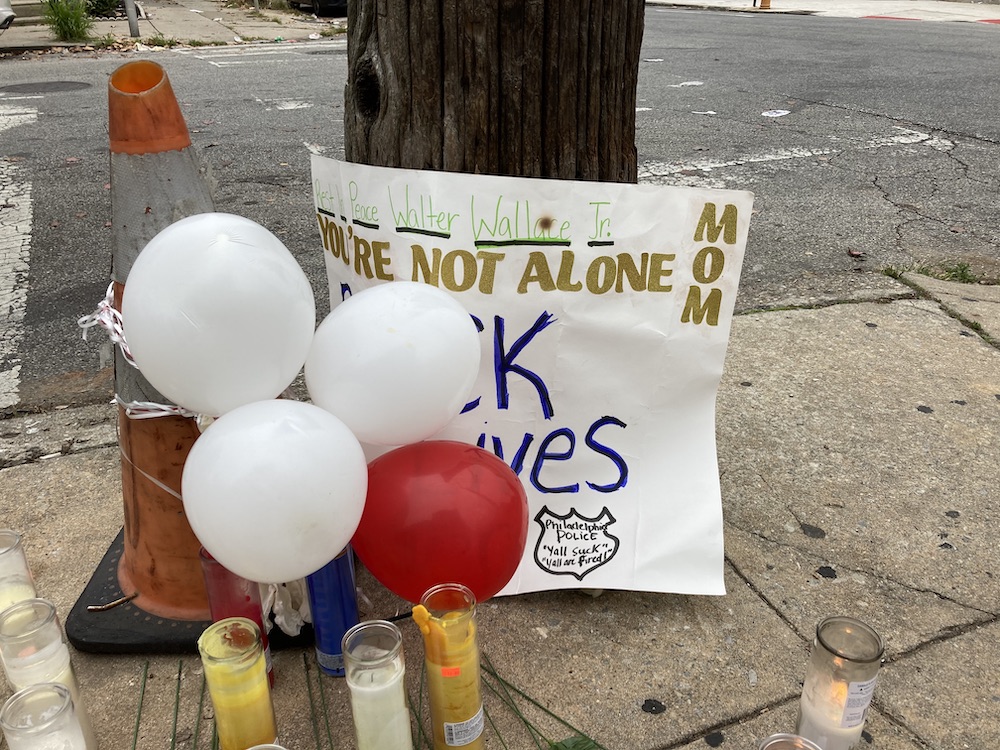Written in response to the police killing of Walter Wallace Jr., this report is co-signed by Slought, the Health Ecologies Lab, the Center for Carceral Communities, and The Colored Girls Museum.
Building upon James Baldwin's statement on the Harlem Six in The Nation on July 11, 1966, we ask, "What are we to do when the state withdraws from the social contract?"

Photo: Walter Wallace Jr. memorial, 61st and Locust St, Philadelphia.
"I am writing a report, which is also a plea for the recognition of our common humanity."
― James Baldwin, A Report from Occupied Territory (1966)
How are we to reckon with the cruelty, the absurdity, of a family asking for help and then watching as their son is murdered? What are we to do when the state withdraws from the social contract?
On the afternoon of Monday, October 26, 2020, the family of Walter Wallace Jr. called 911 to request help in responding to a mental health emergency he was experiencing. Police officers returned to the family home, where they had been twice earlier that day, and as Wallace approached, fatally shot him with fourteen bullets as his mother pleaded for his life.
As the traumatic event of Monday ripples outward, washing over multiple lives and communities in West Philadelphia and beyond, it has intensified feelings of powerlessness, anger, and sorrow. This trauma has further exacerbated the mental health challenges facing the community, which must continue to live in the shadow of the state. It has also highlighted the crisis facing those seeking mental health support—those who, in seeking help, risk further harm to themselves and their family.
Mental health is a basic human right. Safety from the state is a basic human right. The mental health and safety of Black lives is a basic human right. Police responding to a plea for care with an act of killing illustrates how the function of government in Philadelphia has been reduced to a purely punitive logic. In the ensuing days, we have witnessed police actions repeating those which unfolded just months ago: Nonviolent protesters systematically subjected to wanton and unprovoked police violence, and the reimposition of curfews and pervasive helicopter surveillance, long used as a tool for controlling African Americans and restricting the movement of people of color. And during a moment when Philadelphia's citizens continue to reel from a summer occupation, and when concerns about voting safety and fundamental access to democratic processes attenuate nearly every conversation about civic life, a militarized police force has been called in, again. We must ask: what role is the Pennsylvania National Guard being asked to play in our city?
In what has become an endlessly repeating script, the specter of Black "looting" has quickly reappeared in mass media and political discourse—a rhetorical collapsing of State violence and civil unrest that serves to advance a false equivalence about who in fact holds power, and what is in fact taking place. "Looting" has to be understood as a response to the State breaking its social contract with citizens. If the State refuses to honor the sanctity of human life or guarantee the safety of citizens, then it should not expect the latter to honor the sanctity of its laws. The destruction of property is not a marker of chaos. If we are being catapulted more and more into conditions of anarchy, however, it is by a state that unleashes its militarized power on its own citizens. As one West Philadelphia resident noted in a community conversation about the police killing on Wednesday night at the Center for Carceral Communities, "so-called rioters are only the voice-less making their presence known."
We have for too long systematically deprived people of their basic human rights, and through a complex web of intersecting forms of oppression, we have deprived Black bodies of equal access to health, wealth, education, housing, and freedom. As James Baldwin asked in 1966, "what to do in the face of this deep and dangerous estrangement?" We need to advocate not only against the continuous cycle of violence against Black communities in this city, but also begin the process of taking justice into our own hands. Ordinary citizens must take on the responsibility of caring for one another, and commit to nurturing this capacity in each other. We need to invest in the services in our community that are committed to people's wellness, and turn to these services in situations of crisis. Let us appeal to those who already know and believe in the need for a just society--one in which all life has value, and is not up for debate.
We offer the following links and resources for those wishing to offer support:
— Support the family of Walter Wallace, Jr.
— Donate to the Philly Bail Fund
— Sustain community jail support in Philly